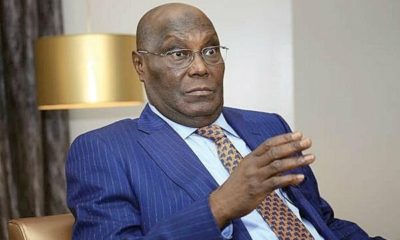
By Ben Benson-Okoli
Napoleon Bonaparte, 1786-1821, was a French Emperor and General whose brilliant victories over Australians and Russians singled him out and made him practically the master of Europe. Addressing his soldiers in 1796 while entering Italy, he said: “It is my design to lead you into the most fertile plains of the world………you will find honor, glory and wealth.”
This sounds familiar today. In his new approach, Rt Hon Benjamin Okezie Kalu, the deputy Speaker and the highest ranking Igboman in Nigeria currently, seems to be telling his tribesmen the same thing.
Also, in his “Maxims of War”, which he published in 1838, Napoleon Bonaparte sees a true leader, as one that “always keeps the element of surprise up his sleeves, which others cannot grasp but which keeps his public excited and breathless.” This too, seems familiar with the style the young Igbo political leader seems to have adopted. Focused, engaging and unpredictable, yet sustaining the interest of those the lot fell on him to lead, he has ostensibly found a sort of connect through his new styles tactics and strategies.
Back home, the late Chukwuemeka Odumegwu Ojukwu, the Ezeigbo Gburugburu was the indisputable leader of Ndigbo, a position many have continued to lay claims to today, even without anything significant on ground to back it up.
The truth is that if Ikemba of Nnewi were to be alive today and had an opportunity to anoint his successor, it is undoubtful, whom he would have passed the baton to. It would have been a man, whose methods, means and mode fits perfectly into foresight and tremendous acumen. No doubt, he would have gladly raised the hand of BOK.
In my piece last year on the same issue, entitled: Enter Benjamin Kalu, the new eye of Ndigbo in Nigeria’s national politics, published in June 11, 2023, two days before he emerged as the number six man in Nigeria, I had x-rayed the man Benjamin Kalu, and his trajectory, showcasing how every inch seemed to prepare him for the current task thrusted on his shoulders,
May be a little recap: “Nobody knows what influenced his parents to name him Benjamin. But going by the narrative about the original bearer of that name in the scriptures, it seems to be turning prophetic in the place of Benjamin Kalu, the new kid on the block in the trajectory of Ndigbo in the Nigeria political firmament.
“Recall the biblical, Jacob, the father of Benjamin loved Rachael, so much that he had to work for the father for years to marry her. But tragedy came when she died while at child birth, not before she named her son Benoni-child of sorrow. But instead of retaining what would have reminded him permanently of the trauma of losing the loved wife, Jacob had to change the name to Benjamin- child of my right hand, child of consolation rather than pain.”
The journey to remove his people from the anguish of the sorrow of the ravages of the civil war started since June 13, when the lot fell on this deep thinker and purveyor of fresh ideas, Rt Hon Benjamin Okezie Kalu, to lead his people; a people badly bruised, wounded and broken by deliberate pummeling. He may have taken the road less traveled but he exudes the audacity of the Johnny Walker, the lanky fine gentlemen on the label of fine whisky, the man who knows where he is going.
Like a good choreographer, well tutored in Napoleon school, BOK has been hitting the right notes, building the right bridges and forging the right partnerships. He admits that his tribesmen are holding the short end of the stick but thinks that what is critical is providing the enabling environment that will re-birth the new Nigeria we all yearn.
His two pet projects, the PISE-P and SEDC are huge. They have the capacity to calm frayed nerves and engender massive economic growth yet to be seen. Peace in South East-Project (PISE-P), is a five-year initiative of the office of the Deputy Speaker, hinged on a non-kinetic method of solving the insecurity challenges in the SE and further reconciliation among the communities and individuals affected by past conflicts. It was unveiled late last year in the ancient city of Bende, in Abia.
BOK had this to say on its launch: “The journey towards peace is not a destination, it is an ongoing process, one that requires commitment and dedication.” Since then, the Bende Declaration, as it now called, has since taken off and on a sound note and the result is gradually showing with the South East becoming quieter unlike before it was a major theatre of war.
SEDC, the South East Development Commission, is another game changer. The speed at which it got the blessings of the House of Representatives, 54years after similar effort had failed, is descriptive of the enormous hardwork of the man who presented the bill. When established, it will not only become the first genuine effort to give Gowon’s triple Rs a meaning but will turn the South East into a massive construction site and a huge rehabilitation center with funds allocated to it from the federation account to address the consequences of the civil war, that is yet to be recovered from.
Given that there are still some naysayers – elements who seek to benefit from the hitherto restiveness in the land, like the avaricious and dignity-stripped onye Nze, and therefore do not want things to change.
They are the ones selling some of the illogical negative arguments all tailored to keep the zone boiling. They are the ones stoking the embers of the release of Mazi Nnamdi Kanu as the condition precedent for peace, without presenting a pragmatic and workable approach to achieve that end.
Yet, the release of MNK is one of the projects closest to the heart of BOK, as those close to him would readily confirm – a project he is consistently, but quietly undertaking without the threats and noise that had over the years made it impossible for the goal to be achieved. Just like Napoleon, the strategy remains embedded inside his chest.
If anyone had been in doubt about his leadership qualities, the setting up of the PISE-P, remains a demonstrable example. The foresight and precision as reflected in the selection of the personnel for the project, showcases not only his vision but the ability at head-hunting to achieve the goal.
No doubt this quality would come handy eventually in creating the political leadership that has eluded the South East in recent past, which is basically the ability to forging the right partnerships and winning the right friendships needed to take the people to the next level.
Even the naysayers and perennial critics, must now be convinced as to the reason BOK has never lost a battle. His uncanny ability to override all forms of distractions, no matter how strong and audacious remains the fundamental reason for trusting him to deliver at this critical time in the life of his people and in Nigeria as a major political force.
Those who know, have identified him as an eloquent speaker, an astute negotiator, a conscientious agitator, awakened mind and transformational leader, who carries with him the message of peace and understanding of the direction he wants to go and where to take his people. Definitely, just like, “the son of our right hand,” BOK will turn out well. That you can take to the bank!
Ben Benson-Okoli Esq., a journalist and lawyer, writes from Abuja

 News3 weeks ago
News3 weeks ago
 News4 weeks ago
News4 weeks ago
 News1 week ago
News1 week ago
 Columns2 weeks ago
Columns2 weeks ago
 News4 weeks ago
News4 weeks ago
 News3 weeks ago
News3 weeks ago
 News4 days ago
News4 days ago
 News6 days ago
News6 days ago




















